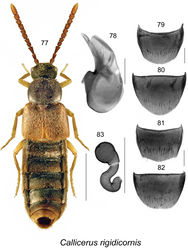Callicerus rigidicornis\according to Klimaszewski et al 2016
| Notice: | This page is derived from the original publication listed below, whose author(s) should always be credited. Further contributors may edit and improve the content of this page and, consequently, need to be credited as well (see page history). Any assessment of factual correctness requires a careful review of the original article as well as of subsequent contributions.
If you are uncertain whether your planned contribution is correct or not, we suggest that you use the associated discussion page instead of editing the page directly. This page should be cited as follows (rationale):
Citation formats to copy and paste
BibTeX: @article{Klimaszewski2016ZooKeys, RIS/ Endnote: TY - JOUR Wikipedia/ Citizendium: <ref name="Klimaszewski2016ZooKeys">{{Citation See also the citation download page at the journal. |
Ordo: Coleoptera
Familia: Staphylinidae
Genus: Callicerus
Name
Callicerus rigidicornis (Erichson) – Wikispecies link – Pensoft Profile
- Homalota rigidicornis Erichson 1839[1]: 82. As Callicerus: Assing 2001[2]: 286; Brunke et al. 2012[3]: 175.
Diagnosis
There are two adventive species of Callicerus reported from Canada (Brunke et al. 2012[3]). Males of Callicerus rigidicornis do not have their antennomere X conspicuously elongate (Fig. 77) as in Callicerus obscurus (for illustration, see Brunke et al. 2012[3]). Callicerus rigidicornis may be distinguished externally from Callicerus obscurus by the more transverse pronotum (Fig. 77), larger body (length 3.5–5.0 mm), and by body colouration with lighter basal half of abdomen (entirely dark brown in Callicerus obscurus). The habitus and genital structures of Callicerus rigidicornis are illustrated in Figs 77–83. For details of European Callicerus species, see Assing (2001)[2].
Distribution
| Origin | Palaearctic, adventive in Canada |
| Distribution | Canada: NL, ON. |
| New records | New provincial record; NEWFOUNDLAND: St. John’s, 47.52°N, 52.785°W, Int. Crop 2007/Plot 1, #187, 2007, Peggy Dixon (MUN), 1 female; Int. Crop 2007/Plot 5, #182, 2007, (MUN), 1 female. |
| References | Erichson 1839[1], Assing 2001[2], Brunke et al. 2012[3] |
Bionomics
The Newfoundland females were captured using pitfall traps in agricultural fields in 2007. In Ontario, specimens were collected in agricultural hedgerows using pitfall traps in 2009 and 2010 (Brunke et al. 2012[3]). Adults were collected in May and June.
Comments
Callicerus rigidicornis was recorded from North America as an adventive species for the first time based on Ontario specimens collected in agricultural hedgerows (Brunke et al. 2012[3]). The NL record may suggest a broader distribution of this adventive species in Canada, but it is unknown whether these records represent separate introduction events. For information on natural history of this species in Europe, see Assing (2001)[2].
Taxon Treatment
- Klimaszewski, J; Langor, D; Bourdon, C; Gilbert, A; Labrecque, M; 2016: Two new species and new provincial records of aleocharine rove beetles from Newfoundland and Labrador, Canada (Coleoptera, Staphylinidae, Aleocharinae) ZooKeys, (593): 49-89. doi
Images
|
Other References
- ↑ 1.0 1.1 Erichson W (1839) Erster Brand. Genera et species Staphylinorum insectorum coleopterorum familiae. FH Morin, Berlin, 1–400.
- ↑ 2.0 2.1 2.2 2.3 Assing V (2001) A revision of Callicerus Gravenhorst 1802, Pseudodemiris Machula 1935, and Sapocallus Sharp 1888. Beiträge zur entomologie 51: 247–333.
- ↑ 3.0 3.1 3.2 3.3 3.4 3.5 Brunke A, Klimaszewski J, Dorval J, Bourdon C, Paiero S, Marshall S (2012) New species and distributional records of Aleocharinae (Coleoptera, Staphylinidae) from Ontario, Canada, with a checklist of recorded species. ZooKeys 186: 119–206. doi: 10.3897/zookeys.186.2947
